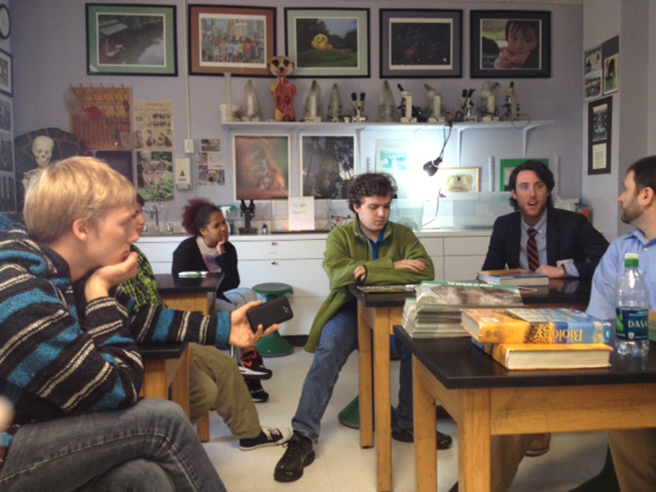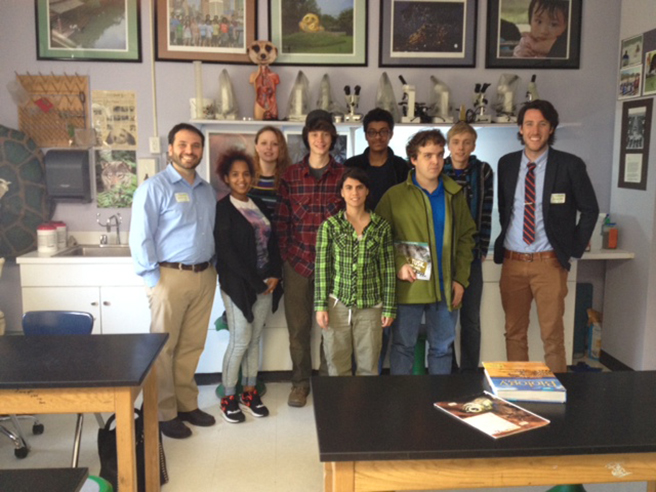Turning the Tide on Poaching

After taking a quick glance at poaching and other environmental statistics, it’s oftentimes hard to figure out what our generation’s environmental legacy will be for our children. Will there be anything left for them? For that matter, will they even be willing to accept this burden?
While the jury is sadly still out on the first question, the answer to the second is most definitely a resounding ‘yes’ thanks to students like those at of The Lab School of Washington, D.C. Using a “nontraditional approach to problem-solving and achievement…suited for a 21st-century success,” the Lab School gives its students the chance to pursue their individual interests through an academic lens. This eventually led to the formation of the Tide Turners, a student-run club that focuses on environmental protection and wildlife conservation.
Started in 2009, the Tide Turners was originally formed as a student travel program that has now evolved into a for-credit field conservation biology summer class. The mission of the club is to empower students with real experience in order to “turn the tide” on the current extinction crisis, with the students themselves driving the goals and direction of the club, trips, and courses.
The Tide Turners have trekked around the globe in support of various environmental programs, from a biodiversity research center in the Peruvian Amazon, to the Karen Beasley Sea Turtle Hospital in Topsail North Carolina, to Whale Camp with the Whale and Sea Bird Research Center on Grand Manan Island, New Brunswick, Canada.

“They work hard and are a dedicated force of nature!” said Beth Frattali, environmental science teacher and founder of the Tide Turners. “High schoolers care passionately for their world and the plants and animals they share it with. They are inheriting a world designed on an unsustainable system and need to learn hopeful and intelligent ways to address the issues. They are hungry for information and ways to apply their creativity to help the world.”
This hunger was especially evident during a presentation I gave about African Wildlife Foundation programs at their Earth Day event. Organized by the students, the Earth Day event is an important opportunity for the students in the club to share their enthusiasm for environmental protection with the rest of the school and showcase many of the programs and trips that they coordinated throughout the year. They chose AWF to present this year because, as Ms. Frattali put it, “[AWF] is one of our main resources throughout the year…and has helped us understand how to feel empowered in the effort [to end poaching].” AWF presenting also dovetailed with the students’ presentation on their recent trip to South Africa.
I must admit, though, that at these sorts of speaking events I’m usually met with bored stares from adults sprinkled with the tepid questions of how large our overhead is. Not many questions about our programs, or even the wildlife that we protect for that matter.
The students at the Lab School gave me a run for my money.
Hands were raised at every opportunity during the end of my presentation, with each one being followed by a thoughtful, direct question. Their insight and enthusiasm for conservation and AWF’s programs was simply amazing; never before have I scrambled to successfully answer each and every question during a presentation. From asking about AWF’s various conservation programs, to wondering why elephants have tusks in the first place, the questions from the students showed their enthusiastic support for the work that AWF does.
"Tide Turners is a club at the Lab School where people care for the world through conservation and helping endangered species,” said the club student president. “Tide Turners is made up of people that are willing to turn the tide. Anyone can be a Tide Turner, as long as you never give up on what you believe."
This willingness to make a difference translated into creating a t-shirt for elephant conservation after their trip to South Africa, the proceeds of which will be donated to AWF’s conservation programs.
After presenting at the Lab School, it seems as though the future of our environment is in good hands thanks to work now being done by student clubs like the Tide Turners.